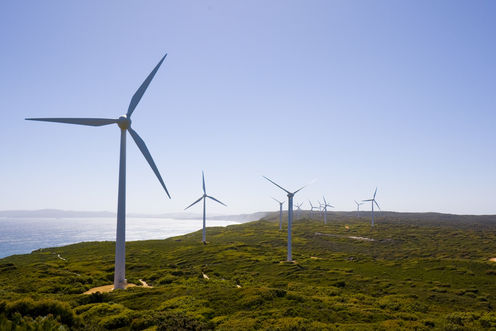 . Clothing brand Patagonia gives 1% of its sales “to support environmental organisations around the world”. Carpet-maker Interface takes an “aggressive approach” to reach its goal to source 100% of its “energy needs from renewable sources by 2020”. Nudie Jeans meanwhile, repairs, reuses and recycles its denim products, as well as using organic cotton to produce them in the first place.
. Clothing brand Patagonia gives 1% of its sales “to support environmental organisations around the world”. Carpet-maker Interface takes an “aggressive approach” to reach its goal to source 100% of its “energy needs from renewable sources by 2020”. Nudie Jeans meanwhile, repairs, reuses and recycles its denim products, as well as using organic cotton to produce them in the first place. So, what’s going on? After decades of activists campaigning against companies’ poor environmental records, are companies suddenly becoming environmental activists themselves?
Normally, companies are challenged by environmental activists from the outside. That is, NGOs, charities and community groups hold companies to account for their often negative impact on the environment. Think VW – it was an NGO that outed the car manufacturer for gaming the emissions testing system.
Remember too last year’s Greenpeace campaign against the Lego-Shell partnership? It was a textbook example of environmental activists using clever social media and protest techniques to raise the public’s awareness about the environmental dangers involved in drilling for oil in the Arctic. And it worked.
Companies as activists
But increasingly companies have become environmental activists themselves. Take Ecotricity, for example, one of Britain’s biggest renewable energy companies, founded by the “travelling hippy” Dale Vince. The company takes an activist stance against fracking in the UK, producing campaign videos that don’t look too dissimilar from those produced by environmental activists. In fact, Ecotricity has teamed up with Friends of the Earth, one of the largest and most influential green NGOs, in its campaign to oppose fracking in the UK.
Cosmetics brand Lush is another successful company that has been very vocal and explicit about opposing fracking in the UK. The company’s co-founder and managing director Mark Constantine (a major baker of Frack Off) is explicit about the fact that campaigning is part of the company’s core culture. Lush’s head of global campaigns, Tamsin Omond, coordinates Lush’s involvement and financing of a number of environmental groups, some of which use quite radical direct action tactics to make themselves heard. She herself is a well-known activist who was arrested in 2013 while protesting in West Sussex. The activist ethos of the company is underpinned by the fact that its own employees – “who are more likely to be drawn from the world of radical politics than business schools” – often play a central role in the environmental causes Lush supports.
This is all a far cry from the questionable attempts by large corporations to green their image. Remember when, about a decade ago, BP tried to tell us that it is now “beyond petroleum”? Its global, multi-million pound marketing campaign spectacularly backfired when the company’s attempt to “think outside the barrel” was quickly named and shamed by Greenpeace and other environmental groups as a classic case of “greenwashing”. Why? Because it was mostly talk, and very little walk, which became all too real when BP became responsible for one of the biggest environmental disasters of modern times – the explosion of the Deep Horizon oil platform in the Gulf of Mexico in 2010.
 Oil-covered pelicans following the BP oil spill in 2010. REUTERS/Sean Gardner
Oil-covered pelicans following the BP oil spill in 2010. REUTERS/Sean Gardner So, why do companies like Lush, Ecotricity and others take such an activist stance for environmental issues? Here are three main reasons:
1. Companies have always been activists
Business has always been about convincing customers, policymakers, employees and the like that companies can be trusted to provide goods and services that contribute to the wider good of society. Henry Ford could be seen as an activist; he wanted to bring automobility to the masses – and he even paid his employees a decent wage so that they could afford his Model T car. So, when Dale Vince founded Ecotricity in the mid-1990s to bring renewable energy to the people of Britain, he, in some ways, is today’s Henry Ford.
2. Capitalism is about competition
Activism is also implanted into the doctrine of capitalism because of competition in the market. Shareholder activism has been around for a long time; it’s a concept used to depict the attempts by some shareholders to get the most out of their investment, making companies more profitable and competitive.
What is new is that environmental issues are used to increase competitive advantage. So, when Ecotricity campaigns against fracking, then it also campaigns against its competitor, British Gas, which has invested significantly in fracking. It’s about engaging customers and making them choose one company and business model over another.
3. Motivating employees
Environmental issues can also be a good motivating factor for employees. Human resource managers constantly think about new ways to keep employees engaged, motivated and loyal.
So when Lush encourages its employees to campaign against fracking, the managers will have at least one eye on the motivation, retention and performance of staff.
Companies are becoming environmental activists because it makes good business sense. But we must scrutinise whether everything that corporate environmental activists tell us is green is indeed green. Employees can function as the litmus paper of corporate green activism. Once we have understood how green activism is reconfigured when it enters the corporate world, we can begin to scrutinise the environmental claims made.![]()
By Steffen Böhm, Professor in Management and Sustainability, and Director, Essex Sustainability Institute, University of Essex, and Annika Skoglund, Associate Senior Lecturer, Uppsala University. This article was originally published on The Conversation. Read the original article. Top image: Lawrence Murray, CC BY



Comments